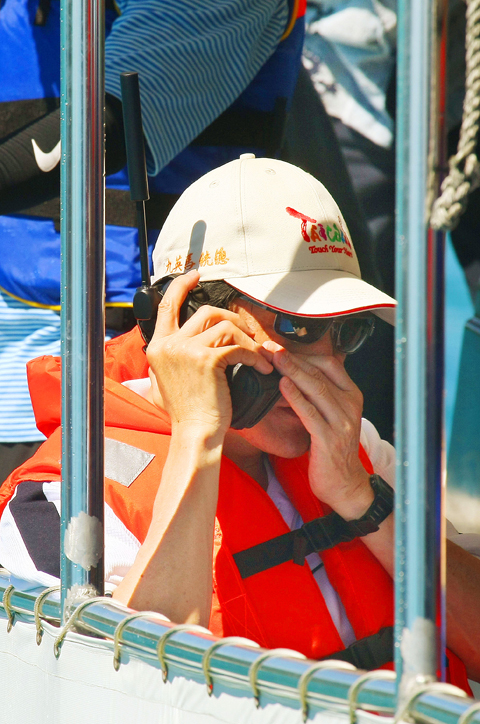On being informed that a South Korean naval patrol vessel sank in disputed maritime waters off the divided peninsula, President Ma Ying-jeou (馬英九), on a state visit to Palau, called an emergency meeting of security officials on Friday night and ordered the activation of Taiwan’s national security mechanism, Presidential Office spokesman Lo Chih-chiang (羅智強) said.
Ma also held a conference call yesterday morning with officials in Taipei, including Vice President Vincent Siew (蕭萬長), Minister of National Defense Kao Hua-chu (高華柱), Premier Wu Den-yih (吳敦義) and Legislative Speaker Wang Jin-pyng (王金平), to gather further information, Lo said.
“The president wants the public to rest assured that the government will keep a close eye on the situation and make all necessary preparations,” Lo said.

PHOTO: CNA
Palau was the sixth and final leg of Ma’s week-long diplomatic tour of Taiwan’s six South Pacific allies. Ma decided to stick to his itinerary in Palau before flying back to Taipei late last night, Lo said. Officials traveling with the president, including National Security Council Secretary-General Hu Wei-jen (胡為真) and Minister of Foreign Affairs Timothy Yang (楊進添), recommended that the government continue to operate normally and the military maintain a general alert, Lo said.
In Taipei, Ministry of National Defense Spokesman Major General Yu Sy-tue (虞思祖) said the ministry was watching the situation carefully and was in close contact with the Presidential Office, the Executive Yuan and national security units.
Yu said military officials would stay on “high” alert, while the military would maintain regular operations and make adjustments when new information is received.
The ministry said that Chief of General Staff Lin Chen-yi (林鎮夷) and three deputy chiefs of general staff have been at the military’s Hengshan Headquarters — the nation’s emergency military command center — monitoring developments.
Ministry of Foreign Affairs spokesman James Chang (章計平) announced that the ministry had established an emergency task force led by Deputy Minister Shen Lyh-shun (沈呂巡) and that this would keep in close contact with Taiwan’s representative office in Seoul, the American Institute in Taiwan and the Taipei Economic and Culture Representative Office in the US, and pass any intelligence received up the chain of command.
Some Democratic Progressive Party (DPP) lawmakers yesterday said Ma’s activation of the national security mechanism was an over-reaction, with DPP Legislator William Lai (賴清德) chiding Ma for largely ignoring the more serious threat in the Taiwan Strait with China targeting more than 1,000 missiles at Taiwan.
At a separate setting yesterday, Premier Wu Den-yih (吳敦義) said the government’s response to the South Korean incident was “appropriate,” dismissing DPP allegations of over-reaction.
“It’s an appropriate reaction as the military did not increase the alert level. If we had not reacted then that would have been irresponsible,” Wu said.
Chinese Nationalist Party (KMT) Legislator Ting Shou-chung (丁守中) said he didn’t find the government’s response to the incident to be excessive.
“Despite the fact that the incident took place some distance from Taiwan, I would rather see the government ready for any eventuality than sitting on its hands doing nothing,” Ting said.

NATIONAL SECURITY THREAT: An official said that Guan Guan’s comments had gone beyond the threshold of free speech, as she advocated for the destruction of the ROC China-born media influencer Guan Guan’s (關關) residency permit has been revoked for repeatedly posting pro-China content that threatens national security, the National Immigration Agency said yesterday. Guan Guan has said many controversial things in her videos posted to Douyin (抖音), including “the red flag will soon be painted all over Taiwan” and “Taiwan is an inseparable part of China,” while expressing hope for expedited “reunification.” The agency received multiple reports alleging that Guan Guan had advocated for armed reunification last year. After investigating, the agency last month issued a notice requiring her to appear and account for her actions. Guan Guan appeared as required,

Japan and the Philippines yesterday signed a defense pact that would allow the tax-free provision of ammunition, fuel, food and other necessities when their forces stage joint training to boost deterrence against China’s growing aggression in the region and to bolster their preparation for natural disasters. Japan has faced increasing political, trade and security tensions with China, which was angered by Japanese Prime Minister Sanae Takaichi’s remark that a Chinese attack on Taiwan would be a survival-threatening situation for Japan, triggering a military response. Japan and the Philippines have also had separate territorial conflicts with Beijing in the East and South China

A strong cold air mass is expected to arrive tonight, bringing a change in weather and a drop in temperature, the Central Weather Administration (CWA) said. The coldest time would be early on Thursday morning, with temperatures in some areas dipping as low as 8°C, it said. Daytime highs yesterday were 22°C to 24°C in northern and eastern Taiwan, and about 25°C to 28°C in the central and southern regions, it said. However, nighttime lows would dip to about 15°C to 16°C in central and northern Taiwan as well as the northeast, and 17°C to 19°C elsewhere, it said. Tropical Storm Nokaen, currently

PAPERS, PLEASE: The gang exploited the high value of the passports, selling them at inflated prices to Chinese buyers, who would treat them as ‘invisibility cloaks’ The Yilan District Court has handed four members of a syndicate prison terms ranging from one year and two months to two years and two months for their involvement in a scheme to purchase Taiwanese passports and resell them abroad at a massive markup. A Chinese human smuggling syndicate purchased Taiwanese passports through local criminal networks, exploiting the passports’ visa-free travel privileges to turn a profit of more than 20 times the original price, the court said. Such criminal organizations enable people to impersonate Taiwanese when entering and exiting Taiwan and other countries, undermining social order and the credibility of the nation’s